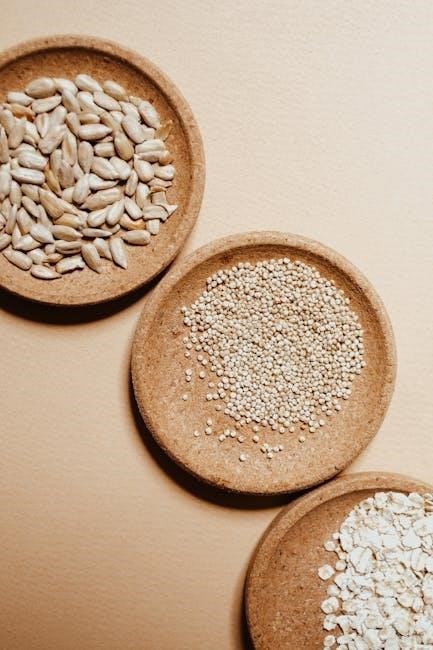The free menopause diet plan empowers women to manage symptoms naturally through balanced nutrition and lifestyle adjustments. Focus on whole foods‚ hydration‚ and mindful eating for better health and wellbeing.
1.1 Understanding the Importance of Diet During Menopause
Diet plays a crucial role in managing menopause symptoms and supporting overall health. Nutrient-dense foods help alleviate hot flashes‚ improve mood‚ and maintain bone density. A balanced diet can also address weight changes and reduce the risk of chronic diseases‚ making it essential for a smooth transition during this life phase.
1.2 Benefits of a Free Menopause Diet Plan
A free menopause diet plan offers a personalized approach to managing symptoms and improving overall health. It provides guidance on nutrient-dense foods‚ helping to alleviate hot flashes‚ support weight management‚ and enhance energy levels. By focusing on whole foods and avoiding processed items‚ this plan promotes long-term wellness without restrictive dieting‚ making it an accessible and sustainable choice for menopause health.

Key Foods for Menopause Symptom Management
Incorporating nutrient-dense foods like colorful vegetables‚ fruits‚ beans‚ lentils‚ nuts‚ and whole grains supports menopause health. These foods help manage symptoms and promote overall wellbeing naturally.
2.1 Protein-Rich Foods for Hormone Balance
Protein-rich foods are essential for hormone balance during menopause. Include lean meats‚ fish‚ eggs‚ dairy‚ legumes‚ and nuts in your diet. These foods support hormone production‚ improve energy levels‚ and contribute to overall health. A balanced intake of protein helps maintain muscle mass and supports weight management‚ which is crucial during this phase. Prioritize whole‚ unprocessed sources for maximum benefits.
2.2 Fruits and Vegetables for Antioxidant Support

Fruits and vegetables are rich in antioxidants‚ which combat free radicals and reduce oxidative stress during menopause. Include colorful options like berries‚ leafy greens‚ and cruciferous vegetables. These foods support immune function‚ protect against chronic diseases‚ and promote skin health. Aim for a variety of fruits and vegetables in your diet to ensure a broad range of antioxidants and essential nutrients for overall wellbeing.
2.3 Whole Grains and Fiber for Digestive Health
Whole grains and fiber are essential for maintaining digestive health during menopause. Foods like oats‚ quinoa‚ and brown rice provide sustained energy and promote regular bowel movements. A high-fiber diet can also help manage cholesterol levels and support healthy blood sugar balance. Incorporating whole grains into meals helps prevent digestive discomfort and supports overall gut health‚ which is crucial during this transitional phase.
Managing Menopause Symptoms Through Nutrition
Nutrition plays a vital role in easing menopause symptoms. A balanced diet rich in whole foods‚ antioxidants‚ and essential nutrients helps alleviate discomfort and supports overall health during this transition.
3.1 Reducing Hot Flashes with Cooling Foods
Focusing on cooling foods can help alleviate hot flashes during menopause. Incorporate salads‚ cucumbers‚ mint‚ and hydrating beverages like herbal teas. Avoid spicy or heavy meals that trigger discomfort. Omega-3 rich foods and antioxidants also support hormonal balance‚ reducing the frequency and intensity of hot flashes. Staying hydrated and avoiding caffeine further enhances comfort and overall well-being during this transitional phase.
3.2 Improving Sleep Quality with Nutrient-Dense Meals
Nutrient-dense meals play a crucial role in enhancing sleep quality during menopause. Focus on lean proteins‚ complex carbohydrates‚ and healthy fats to stabilize blood sugar levels and promote serotonin production. Include magnesium-rich foods like leafy greens and nuts‚ as they relax muscles and improve sleep. Avoid heavy meals and caffeine close to bedtime‚ opting instead for herbal teas or warm milk to foster a restful night’s sleep naturally.
3.3 Balancing Mood Swings with Omega-3 Rich Foods
Omega-3 fatty acids are essential for stabilizing mood swings during menopause. Include fatty fish like salmon‚ mackerel‚ and sardines‚ as well as flaxseeds‚ walnuts‚ and chia seeds in your diet. These foods reduce inflammation and support brain health‚ helping to alleviate emotional fluctuations. Regular consumption can promote emotional balance and overall mental wellbeing‚ making them a key component of a menopause diet plan.

Creating a Personalized Meal Plan
Develop a tailored diet plan by assessing your nutritional needs‚ preferences‚ and lifestyle. Incorporate meal prepping‚ hydration‚ and healthy snacks for consistency and overall wellbeing.
4.1 Assessing Your Nutritional Needs
Evaluate your current eating habits‚ health goals‚ and menopause symptoms to create a personalized plan. Consider calorie needs‚ protein intake‚ and essential nutrients for bone and heart health; Identify any food intolerances or preferences and adjust accordingly. This assessment ensures your diet plan is tailored to your unique requirements‚ promoting overall wellbeing and symptom relief during menopause.
4.2 Meal Prepping for Consistency
Meal prepping ensures consistency in your menopause diet plan by saving time and reducing decision fatigue. Plan weekly menus‚ prepare ingredients‚ and portion meals in advance. Use storage containers to keep food fresh and accessible. Incorporate hydration and healthy snacks into your prep to maintain energy and satisfaction. This practice supports long-term adherence and makes healthy eating easier during menopause.

4.3 Incorporating Hydration and Healthy Snacks
Staying hydrated is crucial during menopause to support overall health and manage symptoms like hot flashes. Aim for at least 8 glasses of water daily and consider herbal teas for additional benefits. Healthy snacks‚ such as fruits‚ nuts‚ and yogurt‚ help maintain energy levels and curb cravings. Incorporate these into your meal plan to ensure balanced nutrition and prevent overeating between meals.
Lifestyle Changes to Support Menopause Health
Adopting a healthy lifestyle during menopause includes regular exercise‚ stress management techniques‚ and adequate sleep. These changes can significantly alleviate symptoms and improve overall well-being naturally.
5.1 The Role of Exercise in Weight Management

Regular physical activity plays a crucial role in managing weight during menopause. Exercise helps control appetite‚ builds muscle mass‚ and boosts metabolism‚ making it easier to maintain a healthy weight. Activities like walking‚ swimming‚ and strength training are effective for burning fat and improving overall body composition‚ supporting long-term weight management and enhancing overall health.
5.2 Stress Management Techniques for Overall Wellbeing
Stress management is vital for overall wellbeing during menopause. Techniques like mindfulness‚ yoga‚ and deep breathing can help reduce stress hormones. Engaging in hobbies and maintaining social connections also provide emotional support. Prioritizing self-care activities‚ such as reading or meditation‚ can enhance mental health and improve resilience to menopause-related challenges‚ fostering a more balanced and peaceful life.
Supplements and Nutrients for Menopause
Supplements like calcium‚ vitamin D‚ and probiotics support bone and gut health during menopause. Omega-3 fatty acids and fiber can also aid in managing symptoms effectively.
6.1 Calcium and Vitamin D for Bone Health
Calcium and vitamin D are essential for maintaining bone density during menopause‚ reducing osteoporosis risks. Aim for 1‚200 mg of calcium daily from sources like dairy‚ leafy greens‚ and fortified foods. Vitamin D‚ often lacking in diets‚ supports calcium absorption. Supplements can help meet these needs‚ especially if dietary intake is insufficient. Both nutrients are critical for long-term bone health and fracture prevention.
6.2 Probiotics for Gut Health
Probiotics support gut health‚ enhancing digestion and immune function during menopause. Found in fermented foods like yogurt‚ kefir‚ and sauerkraut‚ they help balance gut bacteria‚ reducing bloating and irregular bowels. A healthy gut can also improve nutrient absorption and overall wellbeing‚ making probiotics a beneficial addition to a menopause diet plan for better digestive and general health outcomes.

Avoiding Common Diet Mistakes During Menopause
Avoid processed foods‚ added sugars‚ and refined carbs‚ which can worsen symptoms like weight gain and energy crashes. Focus on whole‚ nutrient-rich foods for better health outcomes.

7.1 Limiting Processed Foods and Added Sugars
Reducing processed foods and added sugars is crucial during menopause. These foods can trigger inflammation‚ weight gain‚ and energy fluctuations‚ worsening symptoms like hot flashes and mood swings. Opt for whole‚ unprocessed foods such as vegetables‚ lean proteins‚ and whole grains to stabilize blood sugar and support overall health. Avoid sugary snacks and drinks‚ which can lead to energy crashes and increased cravings.
7.2 Avoiding Refined Carbohydrates
Refined carbs‚ such as white bread‚ pasta‚ and pastries‚ cause rapid blood sugar spikes and crashes‚ exacerbating menopause symptoms like mood swings and fatigue. Replace these with complex carbs like whole grains‚ fruits‚ and vegetables‚ which provide sustained energy and fiber‚ supporting digestive health and weight management. This helps maintain hormonal balance and reduces the risk of chronic diseases associated with menopause.

Comparing Popular Menopause Diet Plans
Explore various diet plans tailored for menopause‚ such as Mediterranean‚ Keto‚ and low-carb diets‚ each offering unique benefits for symptom management and overall health.
8.1 Mediterranean Diet for Menopause

The Mediterranean diet is a popular choice for menopause‚ emphasizing whole foods like fish‚ dairy‚ colorful vegetables‚ fruits‚ beans‚ lentils‚ nuts‚ and whole grains. It promotes heart health‚ weight management‚ and reduces inflammation‚ aligning well with menopause symptom relief. This balanced approach supports overall wellbeing and is adaptable to individual needs‚ making it a sustainable option for long-term health during and after menopause.
8.2 Keto and Low-Carb Diets for Weight Loss
Keto and low-carb diets are often considered for weight loss during menopause‚ focusing on reducing refined carbohydrates and added sugars. These plans emphasize protein-rich foods‚ healthy fats‚ and vegetables‚ which can help stabilize blood sugar and improve energy levels. While effective for weight management‚ they require careful planning to ensure nutrient balance and may not suit everyone due to their restrictive nature.
Adopting a balanced diet rich in nutrients is crucial for managing menopause symptoms. Consulting a healthcare provider ensures a personalized approach for long-term health benefits.
9.1 Maintaining Long-Term Health with a Balanced Diet
A balanced diet is key to maintaining long-term health during menopause. Focus on nutrient-dense foods‚ whole grains‚ fruits‚ vegetables‚ and lean proteins. Incorporate omega-3 rich foods like fish and nuts to support heart health. Stay hydrated and limit processed foods‚ added sugars‚ and refined carbs for better overall wellbeing and symptom management. Consistently following this plan can lead to improved energy levels and reduced menopause symptoms‚ promoting a healthier lifestyle.
9.2 Resources for Further Guidance
For additional support‚ explore online resources like the free menopause diet quiz to personalize your plan. Visit trusted health websites‚ such as the National Health Service or Mayo Clinic‚ for detailed guides. Downloadable PDFs and community forums can also provide practical tips and motivation to help you stay on track with your menopause diet journey and overall wellness.
